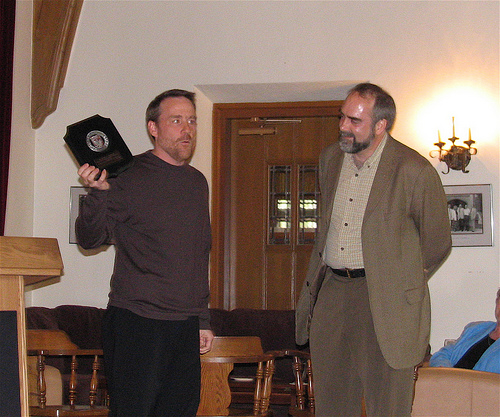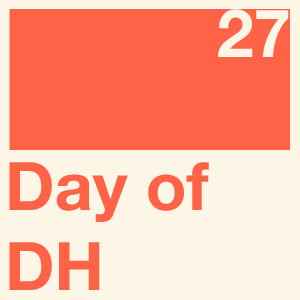Tomorrow (March 27th) is the fourth annual Day of Digital Humanities. I will be blogging the Day of Geoffrey Rockwell. So far there are 254 members so it looks like another active day. People have been twittering under the #dayofdh hashtag. I must remember to charge the batter for my camera.
Category: Blogs and Blogging Culture
Digital Humanities International
Elisabeth drew my attention to this French blog, Digital Humanities International. This blog is supported by Adonis, a large cyberinfrastructure project in France that I blogged about before. The site seems well maintained and they have a good long discussion about the digital humanities in French.
Alberts: On Becoming a Digital Humanist
This week I was invited to give a number of talks at the University of North Dakota. Dr. Crystal Alberts organized the talks (along with others). At UND I spoke on:
- Incorporating the digital in the humanities. This talk was about incorporating the digital into humanities teaching.
- Supporting the Digital Humanities. This talk was for librarians and discussed mostly how libraries can support our work.
- Cyberinfrastructure for the Humanities. This talk was delivered by videoconference and went out to a larger state audience discussing cyberinfrastructure in North Dakota.
Crystal has a nice long blog post on participation and inclusion the digital humanities. The post,On Becoming a Digital Humanist talks about Steve Ramsay’s MLA comments and what I wrote on inclusion.
Pennycuff: Higher Ed Institutional Blogging Server Usage Guidelines
We recently had Derek Pennycuff give a talk at our Humanities Computing Research Colloquium on
“Prioritizing performance optimization for higher education websites.” He pointed me to his blog where he deals with this issue and where he also has a nice summative point on
Higher Ed Institutional Blogging Server Usage Guidelines.
Transcribe Bentham
The Transcribe Bentham is an interesting crowdsourcing project in the humanities that has built an environment to involve people in the transcription of some 60,000 papers of Jeremy Bentham. The project is supported by University College London’s Centre for Digital Humanities.
I’m impressed by how they have adapted tools to develop the participatory environment rather than developing from scratch. The transcription environment is MediaWiki which has been adapted so that you can manipulate a manuscript using Zoomify. They have changed the WYSIWYG editor so that the toolbar available while transcribing corresponds to the tagging they want users to use. Using a wiki gives them the basics of user accounts, versioning, and editing. They also use WordPress for the site about the project and they have added discussion forums to the MediaWiki. There is a nice feature Random Page that takes you directly to a random page in need of editing.
Lost Posts
Dear Readers,
My apologies, but in upgrading this site I have lost the blog posts since May. I am trying to recover them.
Yours,
Geoffrey Rockwell
Gary Hall: Digitize this book
A couple of weeks ago I posted a blog entry about Gary Hall’s book Digitize This Book! I noted that I couldn’t find a digitized copy of the book and asked if others knew of one. To my surprise Gary wrote me back and pointed to the items listed below. Now that is the Internet at work! He is trying to get the publisher to allow a digital copy to be posted online, but in the meantime pointed out online versions of what became chapters in the book:
(2003) ‘Digitise This’, Mediactive, Vol. 1, No. 1 (pp. 76-90); republished in (2004), The Review of Education, Pedagogy and Cultural Studies, Vol. 26, No. 1, January-March (pp. 23-46) at http://scm-rime.tees.ac.uk/VLE/DATA/CSEARCH/MODULES/CS/2006/03/0147/_.doc (MS Word Document)
(2007) ‘IT, Again: or, How to Build an Ethical Virtual Institution’, in Experimenting: Essays With Samuel Weber, edited by Gary Hall and Simon Morgan Wortham (Fordham University Press: New York) (pp.116-140) at http://scm-rime.tees.ac.uk/VLE/DATA/CSEARCH/MODULES/CS/2008/01/0740/_.doc (MS Word Document)
Gary Hall says that “Since the book came out I’ve also published a new piece on open access publishing and the humanities” at http://www.culturemachine.net/index.php/cm/issue/current. A video of him presenting it as a talk is available at Pirate Philosophy – Steal This! .
I take back any irony in my previous post. (Can one take back irony? Perhaps I can only apologize for being ironic to early.)
Blog: Infolet – Informatica e letteratura
My friend Domenico Fiormonte at l’Università di Roma Tre, Dipartimento di Italianistica, has a blog I just found out about with Paolo Sordi called, Infolet – Informatica e letteratura (Informatics and Litterature.) They write longer thoughtful entries (in Italian) rather than my short ones.
In an entry Dai margini dell’Impero (From the margins of the Empire) Domenico criticizes “anglonorthern” computing humanists at DH 2008 for excessive specialization and excessive focus on electronic texts (and a particularly narrow version of text at that.) He goes on to say that we have known there is an anglo-american hegemony (of two or three centres) in the management, both political and scientific of the digital. (See the paper, “The international debate on humanities computing: education, technology and the primacy of languages” PDF in English for a longer discussion of this). These are strong words that, at the very least, reflect a sense of marginalization of researchers working in the European South on Romance languages and coming from a philological tradition.
I am torn as to how to respond to Domenico, but respond we should because he is willing to say things that many feel. Whether we believe the colonialization rhetoric or not, we should be willing to talk about internationalization internationally (and in multiple languages.) My response to the entry and the subsequent comments can be read in the comment I left.
The issue of internationalization and marginalization resonates partly because I work in Canada and here we have a close, but not always equal, relationship with researchers in the US and the UK. To be fair, I think we feel in Canada that we are welcome in digital humanities societies and that US colleagues are more than willing to collaborate. We also are aware of our own fetish of the issue that can distract from meaningful collaboration. If anything we may have a greater role internationally than the size of the population would merit. Our problem is that we ourselves can get caught marginalizing our Québécois colleagues. We have our own two-nations version of this marginalization problem – how to foster a truly bilingual research community avoiding “two solitudes” of research silos, an English rest-of-Canada community and a francophone Québécois community? Our Society for Digital Humanities / Société pour l’étude des médias interactifs is a real and sustained attempt to address bilingual research. Ray Siemens and Christian Vandendorpe deserve a lot of credit for their ongoing efforts in this regard, but we have a ways to go.
Farewell McMaster

With regrets I’m leaving McMaster and going to the University of Alberta. McMaster threw a wonderful farewell party on Monday. Dean Crosta spoke, Andrew Mactavish gave a moving speech, Liss Platt talked, Stéfan Sinclair played Alberta tunes and I was presented with a plaque that will go up on the wall of Togo Salmon Hall where previous digital humanities people at Mac have been recognized. See a small photo set of pictures taken by Stéfan here on Flickr.



